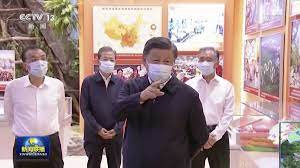
ABC News:
BEIJING — Chinese President Xi Jinping reappeared on state television Tuesday after a several-day absence from public view that sparked rumors about the 69-year-old leader’s political fortunes.
Xi was shown visiting a display at the Beijing Exhibition Hall on the theme of “Forging Ahead into the New Era.”
Accompanied by Premier Li Keqiang and other top leaders, Xi, who is also head of the ruling Communist Party and the People’s Liberation Army, viewed some of the displays and commented on China’s economic progress over the past decade.
The visit was Xi’s first appearance on television since he returned from a regional summit in Uzbekistan last weekend.
Under Chinese pandemic regulations, he would need to stay in quarantine for a week after returning.
China’s opaque system frequently gives rise to rumors of political infighting or attempted coups, despite the stable nature of the authoritarian surveillance state that cracks down relentlessly on any sign of dissent. Xi is widely considered China’s most powerful leader in decades, has no known active challengers, and has removed constitutional term limits, allowing him to rule for life should he wish.
It is not unusual for Chinese leaders to drop out of sight for days or even weeks, for example to attend informal political meetings held at the beachside resort of Beidaihe each summer.
However, the timing of Xi’s absence just weeks before the convening of a key party congress held once every five years provided grist to the rumor mill. Xi is expected to receive a third five-year term as party leader at the congress beginning Oct. 16, in a break with recent tradition that limited leaders to two terms.
China politics expert Kerry Brown said he was highly skeptical that there was anything more to be read into Xi’s brief absence.
“I guess if there was deep dissatisfaction with Xi’s leadership in the elite … we would have seen at least a bit of evidence,” said Brown, professor of Chinese Studies and director of the Lau China Institute at King’s College London. “And I don’t think we’ve seen much evidence of that.”
The party is inherently risk averse, and any person or group seeking to pull off such a radical action would have a very tough time attacking an edifice that has been built almost entirely around Xi, Brown said.
Rumors of coups and infighting are not unusual ahead of sensitive political dates, but the People’s Liberation Army — the party’s military wing — has been disciplined by a sweeping anti-corruption campaign.
“I think it’s wishful thinking maybe in Hong Kong and elsewhere,” he said. “I wouldn’t think it very credible.”


 Users Today : 186
Users Today : 186 Users Yesterday : 65
Users Yesterday : 65 Users Last 7 days : 268
Users Last 7 days : 268 Users Last 30 days : 268
Users Last 30 days : 268 Users This Month : 268
Users This Month : 268 Users This Year : 268
Users This Year : 268 Views Today : 455
Views Today : 455 Total views : 685
Total views : 685 Who's Online : 0
Who's Online : 0